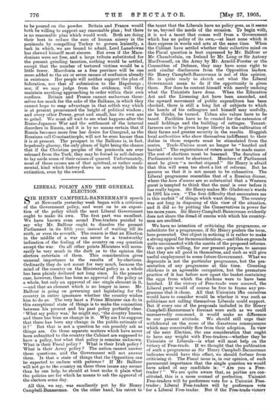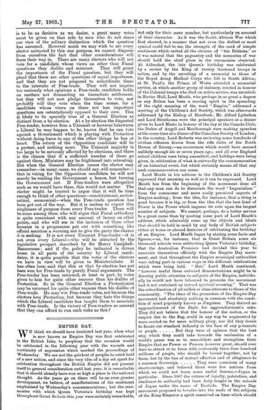S LR HENRY CAMPBELL-BANNERMAN'S speech at Newcastle yesterday week began with
a criticism of the Government policy, and went on to an exposi- tion of the policy which the next Liberal Government ought to make its own. The first part was excellent. We have known even sound Free-traders puzzled to say why Mr. Balfour ought to dissolve the present Parliament in its fifth year, instead of waiting till its sixth, or even its seventh. The reason is that an Election in the middle of a war can never be a trustworthy indication of the feeling of the country on any question except the war. On all other points Ministers will neces- sarily be very much in the dark as to the opinion the electors entertain of them. This consideration gives unusual importance to the results of by-elections. Ordinarily they do not count for very much, because the mind of the country on the Ministerial policy as a whole has been plainly declared not long since. In the present case, however, there has been no approval of the policy as a whole, but only an approval of one single element in it, —and that an element which is no longer in issue. Mr. Balfour is going on governing and legislating for the country in entire ignorance whether the country wishes him to do so. The very least a Prime Minister can do in this exceptional state of things is to make the connection between his present and his past policy perfectly clear. 'What my policy was,' he might say, the country knows, and there has been no change in it. Why am Ito suppose that there has been any change in the public estimate of it ? ' But that is not a question he can possibly ask as things are. On three separate matters which have never been submitted to the country the Cabinet are supposed to have a policy, but what that policy is remains unknown. What is their Fiscal policy ? What is their Irish policy ? What is their Army policy ? The nation cannot answer these questions, and the Government will not answer them. Is that a state of things that the Opposition can be expected to endure with patience ? If Mr. Balfour will not go to the country on these three issues any sooner than he can help, he should at least make it plain what the policies are for which he means to ask the approval of the electors some day.
All this, we say, was excellently put by Sir Henry Campbell-Bannerman. On the other hand, his retort to the taunt that the Liberals have no policy goes, as it seems to us, beyond the needs of the occasion. To begin with, it is not a taunt that comes well from a Government which has no policy of its own,—at least none which it dare express in words and acts at the same time. When the Cabinet have settled whether their collective mind on the Fiscal question is best expressed by Mr. Balfour or Mr. Chamberlain, on Ireland by Mr. Long or Sir Antony MacDonnell, on the Army by Mr. Arnold-Forster or the Committee of Defence, they may have some right to seek similar disclosures from the Opposition leaders. Sir Henry Campbell-Bannerman is not of this opinion. He is quite ready to sketch out what the Liberal Government mean to do if the opportunity is given them. Nor does he content himself with merely undoing what the Unionists have done. When the Education Act and the Licensing Act have been amended, and. the upward movement of public expenditure has been checked, there is still a long list of subjects to which the hands of his colleagues and himself may usefully, as he thinks, be turned. Urban site values have to be taxed. Facilities have to be created for the extension of small holdings and the building of cottages. Tenant- farmers are to be given larger liberty in the cultivation of their farms and greater security in the results. Sluggish local authorities who show themselves indifferent to their duties in these respects must be stimulated from the centre. Trade-Unions must no longer be "hustled and harried." The registration of voters must be made easier. The cost of elections must be lessened. The duration of Parliaments must be shortened. Members of Parliament must be given "a modest stipend." Sir Henry is afraid that this will seem too short a list of reforms. But he assures us that it is not meant to be exhaustive. The Liberal programme resembles that of a Russian dinner, where the hors d'ceuvre are so substantial that a Western guest is tempted to think that the meal is over before it has really begun. Sir Henry makes Mr. Gladstone's words in 1891 his own. "The first difficulty that encounters me is this surfeit" of things which want doing. The country was not long in disposing of this view of the situation, and it did so by putting the Conservatives in power for ten more years. Sir Henry Campbell-Bannerman evidently does not share the dread of omens with which his country- men are credited.
We have no intention of criticising the programme, or substitute for a programme, if Sir Henry prefers the term, here presented. Our object in noticing it is rather to make a strong appeal for its reconsideration,—and this on grounds quite unconnected with the merits of the proposed reforms. We are quite willing, for our present purpose, to assume that they are all good in themselves, and such as will give useful employment to some future Government. What we deprecate is not the particular programme, but the pre- sentation of any programme at this time. Counting chickens is an agreeable occupation, but the premature practice of it has before now upset the basket containing the eggs from which the chickens were to have been hatched. If the victory of Free-trade were assured, the Liberal party would of course be free to frame any pro- gramme that it chose. All that Unionists 1Pke ourselves would have to consider would be whether it was such as politicians not calling themselves Liberals could support. But if every one of the proposals included in Sir Henry Campbell-lSannerman's forecast were such as we could unreservedly commend, it would make no difference to our present attitude. We should still urge their withdrawal on the score of the disastrous consequences which may conceivably flow from their adoption. In view of the next Election, the one consideration that ought to have any weight with Free-traders—whether they be Unionists or Liberals—is what will most help on the victory of Free-trade. If we thought that the publication of such a programme as Sir Henry Campbell-Bannerman indicates would have this effect, we should forbear from criticising it. The Fiscal issue is, in our opinion, of such paramount important* that the single question we would have asked of any candidate is : "Are you a Free- trader ? " We are quite aware that, as parties are con- stituted, this is a mere counsel of perfection. Unionist Free-traders will by preference vote for a Unionist Free- trader ; Liberal Free-traders will by preference vote for a Liberal Free-trader. But if the Free-trade victory is to be as decisive as we desire, a great many votes must be given on that side by men who do not share our view of the solitary distinction which the question has assumed. However much we may wish to see every elector animated by this one purpose, we cannot disguise from ourselves the fact that other considerations will force their way in. There are many electors who will not vote for a candidate whose views on other than Fiscal questions they dislike and mistrust. They will grant the importance of the Fiscal question, but they will plead that there are other questions of equal importance, and that they are not prepared to subordinate these to the interests of Free-trade. They will not inquire too curiously what opinions a Free-trade candidate holds on matters not demanding an immediate settlement, but they will not Snow pledge themselves to vote, nor probably will they vote when the time comes, for a candidate whose views on these not less important questions are ostentatiously opposed to their own. This is likely to be specially true of a General Election as distinct from a by-election. At a by-election the disgusted Free-trader, however firm a Unionist or however lukewarm a Liberal he may happen to be, knows that he can vote against a Government which is playing with Protection without doing harm to any of the other things he has at heart. The return of the Opposition candidate will be a protest, and nothing more. The Unionist majority is too large to be seriously affected by by-elections, and there is the chance that if a sufficient number of these go against them, Ministers may be frightened into retreating. But when the General Election comes the elector may remember—in many cases, we should say, will remember— that in voting for the Opposition candidate he will not merely be reading the Government a lesson, but turning the Government out. If Free-traders were altogether such as we would have them, this would not matter. The elector might be trusted to argue that it will be time enough to think of other questions—constitutional, ecclesi- astical, economical—when the Free-trade question has been got out of the way. But it is useless to expect this singleness of purpose from every Free-trader. There will be some among them who will argue that Fiscal orthodoxy is quite consistent with any amount of heresy on other points, and who will see in the inclusion of these other heresies in a programme put out with something like official sanction a warning not to give the party the chance it is seeking. It is not every Unionist Free-trader—it is not even every Liberal—who will be attracted by the legislative prospect described by Sir Henry Campbell- Bannerman ; and if the policy he indicated is driven home in all parts of the country by Liberal candi- dates, it is quite possible that the votes of the electors we have in view will be given to Ministerialists. It has often been said that this or that by-election has not been won for Free-trade by purely Fiscal arguments. The Free-trader has been returned, at least in part, by votes given to him for quite other reasons than his dislike of Protection. So in the General Election a Protectionist may be returned for quite other reasons than his dislike of Free-trade. He may win Free-trade votes, not because the electors love Protection, but because they hate the things which the Liberal candidate has taught them to associate with Free-trade. Is the victory of Free-traders so assured that they can afford to run such risks as this ?







































 Previous page
Previous page